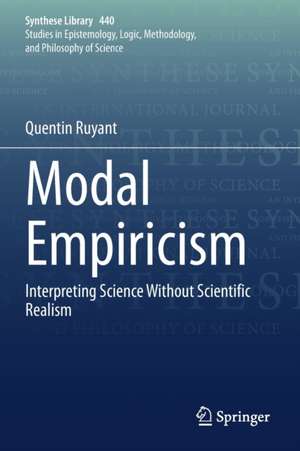Modal Empiricism: Interpreting Science Without Scientific Realism: Synthese Library, cartea 440
Autor Quentin Ruyanten Limba Engleză Paperback – 8 mai 2022
This book is of interest to any philosopher involved in the debate on scientific realism, or interested in how to properly understand the content, aim and achievements of science.
| Toate formatele și edițiile | Preț | Express |
|---|---|---|
| Paperback (1) | 724.32 lei 6-8 săpt. | |
| Springer International Publishing – 8 mai 2022 | 724.32 lei 6-8 săpt. | |
| Hardback (1) | 730.35 lei 6-8 săpt. | |
| Springer International Publishing – 8 mai 2021 | 730.35 lei 6-8 săpt. |
Din seria Synthese Library
- 15%
 Preț: 638.43 lei
Preț: 638.43 lei - 18%
 Preț: 989.98 lei
Preț: 989.98 lei - 15%
 Preț: 596.69 lei
Preț: 596.69 lei - 18%
 Preț: 903.93 lei
Preț: 903.93 lei - 15%
 Preț: 586.88 lei
Preț: 586.88 lei - 15%
 Preț: 696.50 lei
Preț: 696.50 lei - 18%
 Preț: 892.90 lei
Preț: 892.90 lei - 15%
 Preț: 643.34 lei
Preț: 643.34 lei -
 Preț: 282.33 lei
Preț: 282.33 lei - 5%
 Preț: 372.19 lei
Preț: 372.19 lei -
 Preț: 443.10 lei
Preț: 443.10 lei - 15%
 Preț: 637.59 lei
Preț: 637.59 lei - 18%
 Preț: 958.88 lei
Preț: 958.88 lei - 15%
 Preț: 642.36 lei
Preț: 642.36 lei - 18%
 Preț: 1230.66 lei
Preț: 1230.66 lei - 15%
 Preț: 642.83 lei
Preț: 642.83 lei - 18%
 Preț: 1000.39 lei
Preț: 1000.39 lei -
 Preț: 389.70 lei
Preț: 389.70 lei - 15%
 Preț: 637.28 lei
Preț: 637.28 lei - 18%
 Preț: 952.26 lei
Preț: 952.26 lei - 18%
 Preț: 1231.32 lei
Preț: 1231.32 lei - 15%
 Preț: 645.96 lei
Preț: 645.96 lei -
 Preț: 395.85 lei
Preț: 395.85 lei -
 Preț: 400.47 lei
Preț: 400.47 lei - 18%
 Preț: 1225.48 lei
Preț: 1225.48 lei - 15%
 Preț: 638.89 lei
Preț: 638.89 lei - 18%
 Preț: 1232.09 lei
Preț: 1232.09 lei -
 Preț: 380.45 lei
Preț: 380.45 lei -
 Preț: 394.87 lei
Preț: 394.87 lei - 15%
 Preț: 640.37 lei
Preț: 640.37 lei - 15%
 Preț: 639.08 lei
Preț: 639.08 lei -
 Preț: 381.98 lei
Preț: 381.98 lei - 15%
 Preț: 643.00 lei
Preț: 643.00 lei - 15%
 Preț: 672.29 lei
Preț: 672.29 lei
Preț: 724.32 lei
Preț vechi: 883.31 lei
-18% Nou
Puncte Express: 1086
Preț estimativ în valută:
138.61€ • 144.53$ • 115.20£
138.61€ • 144.53$ • 115.20£
Carte tipărită la comandă
Livrare economică 21 martie-04 aprilie
Preluare comenzi: 021 569.72.76
Specificații
ISBN-13: 9783030723514
ISBN-10: 3030723518
Ilustrații: XIV, 230 p. 17 illus.
Dimensiuni: 155 x 235 mm
Greutate: 0.35 kg
Ediția:1st ed. 2021
Editura: Springer International Publishing
Colecția Springer
Seria Synthese Library
Locul publicării:Cham, Switzerland
ISBN-10: 3030723518
Ilustrații: XIV, 230 p. 17 illus.
Dimensiuni: 155 x 235 mm
Greutate: 0.35 kg
Ediția:1st ed. 2021
Editura: Springer International Publishing
Colecția Springer
Seria Synthese Library
Locul publicării:Cham, Switzerland
Cuprins
1. The Debates on Scientific Realism.- 2. Theories, Models and Representation.- 3. Contextual Use and Communal Norms.- 4. Modal Empirical Adequacy.- 5. Situated Possibilities, Induction and Necessity.- 6. Scientific Success.- 7. Theory Change.- 8. Semantic Pragmatism.
Recenzii
“Ruyant’s book is intricate, dense, and interesting. … I recommend this book for those who want an overview of the literature on models and representation, those who want to learn more about different empiricist positions, particularly alternatives to Constructive Empiricism, and those who (like myself) are greatly interested in the development of scientific metaphysics compatible with empiricism.” (Richard Lauer, Journal for General Philosophy of Science, Vol. 54 (4), 2023)
Notă biografică
Quentin Ruyant is currently a post-doctoral fellow in Philosophy of Science at Universidad Nacional Autónoma de México. He obtained his PhD in Philosophy of Science at UCLouvain / Université de Rennes 1. He has been working on scientific realism, structural realism and empiricism, and is currently doing research on the role of modalities in scientific representation.
Textul de pe ultima copertă
This book proposes a novel position in the debate on scientific realism: Modal Empiricism. Modal empiricism is the view that the aim of science is to provide theories that correctly delimit, in a unified way, the range of experiences that are naturally possible given our position in the world. The view is associated with a pragmatic account of scientific representation and an original notion of situated modalities, together with an inductive epistemology for modalities. It purports to provide a faithful account of scientific practice and of its impressive achievements, and defuses the main motivations for scientific realism. More generally, Modal Empiricism purports to be the precise articulation of a pragmatist stance towards science.
This book is of interest to any philosopher involved in the debate on scientific realism, or interested in how to properly understand the content, aim and achievements of science.
This book is of interest to any philosopher involved in the debate on scientific realism, or interested in how to properly understand the content, aim and achievements of science.
Caracteristici
Articulates a novel empiricist position in the debate on scientific realism Critically examines and proposes an alternative to Van Fraassen’s constructive empiricism Provides an inductive epistemology for modalities that could be of interest beyond philosophy of science
